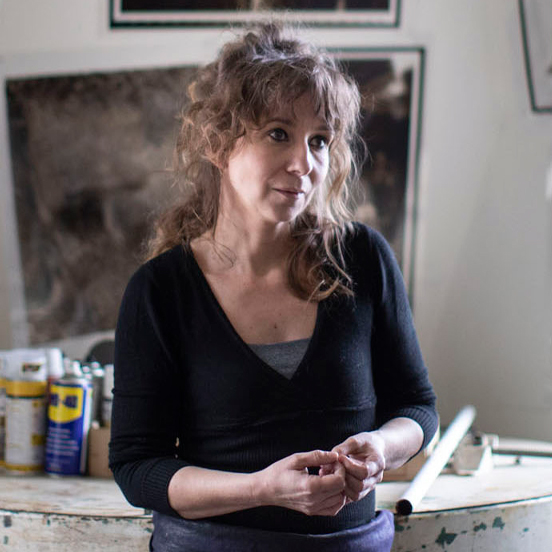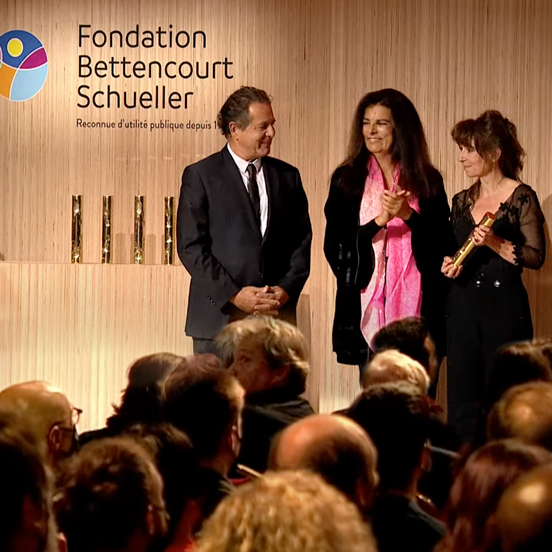Fanny Boucher graduated from the Ecole Supérieure des arts et industries graphiques Estienne (Graduate School of Arts and Printing Industry) in intaglio engraving. In 1998, she specialized in the Talbot-Klic technique of photo-etching thanks to her training with Jean-Daniel Lemoine. He is an expert in the 19th century photomechanical processes.
Fanny Boucher having acquired this rare expertise, she founded the Atelier Heliog in 2000. It is a place of creation dedicated to intaglio techniques, especially photo-etching.
Since then, Fanny Boucher has provided her skills and support to numerous artists, gallerists and international publishers, as well as to designers and interior designers. Thus, Atelier Heliog offers a complete, unique and specific expertise of photogravure, in its finest tradition ranging from artist’s books to engravings, as well as an unprecedented opening to interior art and design.


Fanny Boucher has been a member of the Grands Ateliers de France since 2007, and her workshop was awarded the title of Intangible Cultural Heritage in France in 2008. In 2015, Fanny Boucher was given the title of Master of Arts, which allowed her to teach her skills from 2015 to 2018. Her student then founded her own workshop, Atelier Marie Levoyet. Heliog still works with her on a regular basis. In 2020, Fanny Boucher is the winner of the Bettencourt Prize for the Intelligence of the Hand in the category Outstanding Talent for her creation Arboris.
Fanny Boucher exhibited at the Tokyo National Museum in 2017 and then Beijing in 2019 along with 14 other French Masters of Arts in the Wonder Lab exhibition organized by Heart & Crafts. Her work has also been exhibited at the Institut Français in the United Kingdom during the London Craft Week in 2018, at Philip’s Collection in Washington, D.C. in 2019 and at the Giorgio Cini Foundation’s Homo Faber exhibition in Venice in 2018 and 2022.
Alongside her activities as a fine craftswoman who works with artists and as a creator herself, Fanny Boucher is very committed to the societal role of fine crafts and their transmission.
The Kronik collection was developed in the aftermath of the terrorist attack at the Charlie Hebdo headquarters in 2015.
Together with cartoonists (Jean-Denys Philippe, Marilena Nardi) and photojournalists (Edouard Elias, Santiago Albert, Matias Corral, Lely Constantinople, Michelle Frankfurter and soon Abulmonam Eassa), Fanny Boucher engraved press cartoons or news photographs, printed them and went to meet people for whom access to art is very difficult. She met them in a street in Washington, D.C., in secondary schools and vocational schools in Calvados during the Bayeux Prize for war reporters with Edouard Elias, in secondary schools in the Paris suburbs, with students from the French school for young people called “école de la seconde chance”, etc.
Carrying a small press, with her hands covered in ink, she and her colleague Marie Levoyet discuss current issues (freedom of speech, North-South disparities, refugees, feminicides, Syria, Iraq, Ukraine, Cambodia…) with young people, mostly from less privileged areas, thanks to the photogravures she has made. Each participant is then invited to choose an image and to print it. Two copies are offered to them at the end of the discussion: one that they keep for themselves and another one that they have the mission to hand over to someone else.
These interventions lead to enriching and rare exchanges.
Kronik aims to go back to the roots of printmaking as a means of disseminating a political message, as a committed, street printmaking, which also is a player of its time.